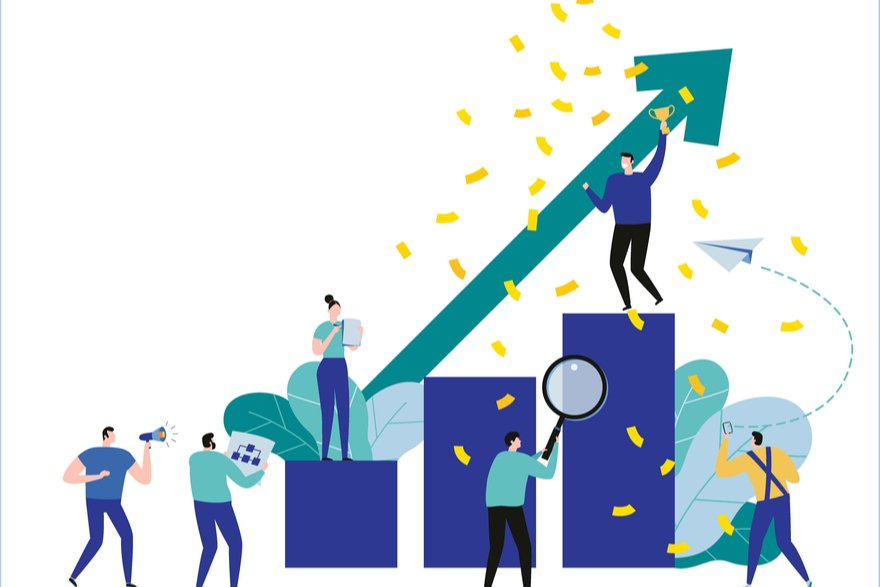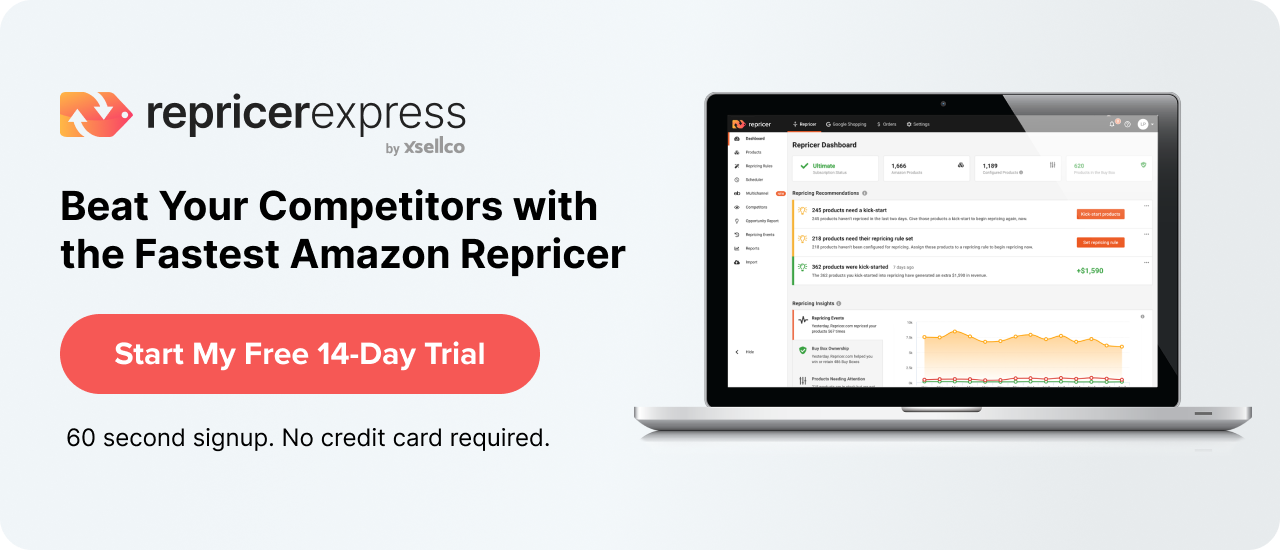If you want to scale your Amazon business then check out this great guest post from Amazon FBA seller Jeff Roth.
Believe me when I say that I’ve listened to enough FBA podcasts, webinars, interviews and the like to fill 20 iPods. I’m a sucker for hearing other sellers’ stories and how they got to where they are now. Sucker might not be the right word but I truly believe I can pull bits and pieces from every single person’s story that will help me in my FBA journey.
I’ve learned new ways to appeal to Seller Central for lost monies, networked with other FBAers via means I never knew existed and learned at least ten new sourcing spots both retail and online that I never would have known about if I hadn’t soaked in all of the knowledge.
Think you know how to set up your repricer to get the most out of your inventory?
I did too but alas, others way smarter and savvier people than myself taught me strategies I never would have thought of.
You may think you’re the king of FBA but you don’t know everything. If you’re new at this FBA game, listening to others with proven track records is without question the number one way to figure out the best ways to grow your FBA business.
Did I just say grow? Like many other sellers who have been doing this for a decent amount of time successfully, the discussion of where to go with the business will ultimately arrive. No one wants to be stagnant yet for many part-time sellers looking for supplemental income, it’s ok to not reach for the stars.
For others doing this as a more serious business venture, the notion of being able to grow their business and scale is a key factor in the ability to grow at desired rates.
Below are four ways to potentially scale your Amazon business.
4 Ways to Scale Your Amazon Business
1. Scaling in Retail Arbitrage
Some will argue that the method of doing Retail Arbitrage (RA) store to store is not truly a scalable business. Too time-consuming and a limited amount of varying inventory plus stiff competition from other local sellers. I would argue that there is a scalable aspect to RA and that would be to hire shoppers to do the work for you.
Why not train and pay shoppers $10/hour if they’re able to return you 2-3 x that rate on the items they source? That’s scaling a business in the most basic form. Many sellers do this and are extremely successful at it because they have a solid game plan and train their sourcers well.
The negative to this technique is there is a time input for training required and a trust issue you are putting into your employees to have the skills to find good deals to flip. Plus, pealing stickers, prepping items and ultimately sending the items into Amazon takes time and manpower.
For me, on a scale of 1 to 10, I’d rate scaling an RA business at a 2 in terms of ease and potential gains of scaling. Too many people are scouring Target and Walmart and purchasing the same items that you are. It’s a bit too much labour for my taste.
2. Scaling in Online Arbitrage
Let’s turn to Online Arbitrage (OA) in terms of being able to scale your FBA business. On the surface, this would be the dream scenario to scale a business. Sitting at home sipping your latte while finding great flip-able deals for big bucks works for most, right?
Well, if you’ve tried OA for any length of time you know that high margin, well-ranked items are not just sitting out there in bunches for us to buy up. So how would one scale their OA business effectively?
There are two ways to look at this. Firstly, find more sites to search and have others do the searching for you. Pretty simple. Secondly, find tools that will make the act of finding good deals quicker and more efficient. Some combination of the two would make the most sense, training others to use the tools to find more and find them faster.
The obvious negative is that every item online is available to the world. No mom and pop shops here. You don’t think every other FBA nerd is on Walmart.com too?
Finding those not so obvious online shops that provide great deals is the key to winning online. Scaling means being able to teach OTHERS to find more and more sites for flipping. Think you can do this successfully?
Overall I would put OA at a 6/10 for scaling.
One bonus to OA: There are many pack and prep centres popping up to assist Amazon sellers in handling their OA inventory. By paying between $1-2 per item, these centres will receive all of your OA inventory, remove labels/stickers, bag and ship into Amazon for you (plus the cost of inbound shipping). Using these types of services will greatly help in the scaling aspect of FBA.
3. Scaling in Wholesale
The world of Amazon wholesale is one that I will admit I have zero experience in. There are many courses and experts on Facebook groups who I would highly suggest consulting with to get a better grip on the ability to win in wholesale. What I do know is that the margins are much tighter doing wholesale sourcing, however, the availability of inventory is vast.
When you see million-dollar sellers on Amazon, most likely they are doing it via wholesale methods. What else does this mean? If you want to scale in this realm you need lots of capital. Spend a lot to make a lot and more.
So how would one scale by doing wholesale? Easy: find more wholesale suppliers. Teach a virtual assistant (Amazon VA) how to find, communicate with and eventually purchase from various wholesale suppliers. Secondly, use the aforementioned pack and prep companies to receive and handle this inventory. I think that’s pretty much how it’s done. More capital, more products, less hands-on care.
The cons to wholesale are that although the items may be high selling ones, you will most likely be sharing the Buy Box with other large scale wholesale sellers who could potentially be getting the same product at a better cost than you and a price war could ensue. With margins being thin, to begin with, this could lead to disaster.
Overall, I would rate wholesale scalability at a 7/10 due to the sheer number of items available.
4. Scaling in Private Label
The golden goose of FBA is our final scaling subject. If you don’t know what private labelling is, you’re basically having products manufactured for you with your own company logo or labelling on the product. Most sellers source the items overseas in China or India, however, some are able to manufacture in the US and still maintain margins high enough to profit.
The huge advantage to private labelling is that because the product is yours and thus cannot be sold by anyone else without your permission, you will always own the Buy Box. It doesn’t get any better than that.
So how would one scale a private label FBA business? It’s very similar to wholesale in that you simply need to find more products that can sell at a high rate with margin. Some successful private labellers hire employees in China to find them good products from trusted manufacturers.
One thing to remember with private label is that most use websites such as Alibaba or Global Sources to find their products and manufacturers. This can be very tricky not only due to the uncertainty of the other half but also language barriers and financial transaction trust.
Finding good private label worthy products is a whole other discussion for another day but once one gets good at finding these types of products they can simply outsource this process and the scaling can begin. Again, having a lot of working capital is key because you will need to put a lot of moolah out upfront in order to gain the trust of your manufacturer. They want to know you are serious about using their services.
Of the four scaling methods, I would rate private labelling at an 8/10 simply due to the Buy Box ownership potential. There are many technical pitfalls and hurdles that won’t allow me to put it at a 10/10 and I would suggest to newer FBA sellers to avoid private label until they are fully immersed in the RA and OA methods so they understand how Amazon works from the seller side of things.
Ready to scale your business? We are too. After doing FBA for 1.5 years, we are now in the process of private labelling our first 2 items. It’s very exciting and we’re eager to see where things go from here. With that being said, we are still heavily invested in OA and RA methods because they work. Private labelling is our first foray into scaling our business to the next level.
Get back to work!
Related: What is Amazon Repricing Software and How Does it Work?



